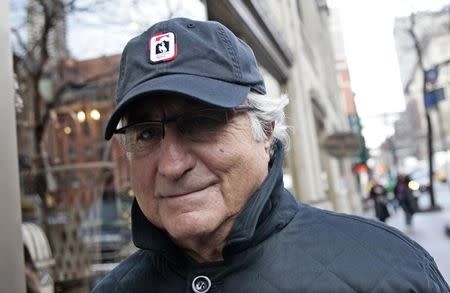Exclusive: Accountant's plea signals more possible scrutiny of Madoff son
By Joseph Ax NEW YORK (Reuters) - U.S. prosecutors may still be building a case against imprisoned swindler Bernard Madoff's only surviving son, who according to sources was one of the "co-conspirators" mentioned in a plea deal by a Madoff associate last month. Two sources familiar with the Madoff case confirmed to Reuters that people identified only as "co-conspirators" in statements and court documents at accountant Paul Konigsberg's June 24 plea hearing are Madoff's sons, Mark and Andrew, who were employees of the Madoff investment firm. Mark Madoff committed suicide in December 2010 at the age of 46 on the second anniversary of Bernard Madoff's arrest. Andrew Madoff, 48, spoke publicly last year about his battle with stage-four blood cancer, though his current health is unclear. Andrew Ehrlich, a lawyer for Andrew Madoff and Mark Madoff's estate, declined to comment on the case. Speculation about whether the sons knew of their father's decades-long, worldwide fraud has persisted since its collapse. They have denied any involvement in the scheme, which is estimated to have cost investors $17 billion in principal. A spokesman for Manhattan U.S. Attorney Preet Bharara said only that the Madoff investigation continues, including efforts to recover assets for victims of the Ponzi scheme, in which the money of new investors was used to pay returns to earlier clients. Last September, The New York Times reported that prosecutors had examined Andrew Madoff's conduct. But the Konigsberg case is the first signal in months that the government may still be contemplating charges. Konigsberg signed a deal to cooperate with prosecutors as part of his plea. With no charges pending against anyone else, the deal, coupled with the references to the Madoff sons as co-conspirators, suggests prosecutors hope Konigsberg may be able to provide evidence against Andrew Madoff, a legal expert said. "It certainly does indicate that the government thinks they committed crimes," said Robert Anello, a white-collar defense lawyer not involved in the case. "If they haven’t already been charged, it would certainly make you sit up and take notice if you’re their lawyers." That said, prosecutors sometimes refer to co-conspirators in court filings, but may not end up charging them if they do not have enough evidence, Anello added. Bernard Madoff, 76, is serving a 150-year prison sentence after pleading guilty in March 2009. Konigsberg, who provided accounting services for some of Madoff's biggest clients, was the 15th person to be convicted in connection with the fraud. UNPAID LOANS Like most defendants pleading guilty, Konigsberg was required to tell a judge what he had done wrong, acknowledging he filed tax returns for various Madoff clients based on altered customer statements. He said he was unaware of the Ponzi scheme, however, and prosecutors said he had not intended to assist in the broader fraud. But after admitting his guilt, Konigsberg added an unusual statement concerning actions he said he took that were perfectly legal. He said he gave Madoff "accurate and proper" tax advice regarding money Madoff wished to transfer to two unidentified "co-conspirators" who worked at his firm. Konigsberg said he told Madoff the money would be tax-free if structured as loans, as long as the loans were repaid, and referred Madoff to a lawyer to help him do so. Assistant U.S. Attorney Matthew Schwartz said Madoff and the co-conspirators then used the "accurate" advice to set up tax-free loans that were never intended to be repaid. Prosecutors also referred to the loans in a court filing containing the charges against Konigsberg. Between roughly 1995 and 2008, Madoff transferred more than $20 million to each of the co-conspirators through these loans, "which resulted in the payment of no additional taxes" by Madoff and the co-conspirators, the filing said. Since the outset of the case and during the search to recover money, criminal and civil investigators have scrutinized the loans while trying to determine what family members knew. Another relative who worked at the firm, Bernard Madoff's brother Peter, pleaded guilty and was sentenced to 10 years in prison in 2012. In forfeiture proceedings filed against Bernard Madoff in 2009, prosecutors sought to seize promissory notes for loans he and his wife made to Andrew and Mark for more than $30 million in total. Meanwhile, Irving Picard, the trustee in charge of recovering assets for Madoff’s victims, has sued Mark and Andrew Madoff, claiming they collected millions of dollars through sham loans that were essentially tax-free gifts from the mid-1990s to 2008. Picard asserted that Andrew Madoff collected nearly $75 million from the Madoff firm, including $13 million in unpaid loans. Picard also has sought to seize several homes owned by the brothers, including apartments in Manhattan and houses in Greenwich, Connecticut. Apart from the loans, the Konigsberg document refers to a 2002 transaction in which the two co-conspirators, along with Konigsberg, Bernard Madoff, Peter Madoff and another person, donated property to a charity to secure a tax deduction. The donation was legitimate, but according to the Konigsberg filing, former Madoff portfolio manager Annette Bongiorno backdated fake trades in the two co-conspirators' accounts to ensure their gross income was high enough to take a deduction of more than $2 million. A similar-sounding transaction involving the two sons came up during the trial of Bongiorno and four other Madoff aides last year, who were all eventually convicted. Former Madoff accountant David Friehling testified that he and Bernard Madoff once discussed making sure that Mark and Andrew had enough gross income to take a full deduction on a "large charitable donation." (Editing by Eric Effron, Amy Stevens and Noeleen Walder; Grant McCool)



